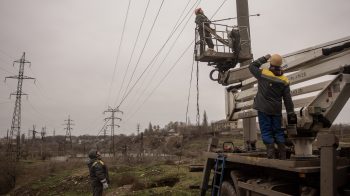Ukraine decides between east and west
When it comes to global trade, countries only have a couple of options: They can set up shop on their own, or they can team up with their neighbors, to do business on special terms, in a trade-bloc. It’s what the Europeans do with the EU, and it’s what the U.S. does with NAFTA.
And it’s what the Russians want to do with a bunch of former Soviet republics in what’s being called a Eurasian Union.
Ukraine is located between Russia and Europe, and it has a difficult choice of partners, but it looks as though it’s decided its future lies in the East. The country, one of Europe’s biggest, has been courted by east and by west. The EU has offered Ukraine an historic free trade deal, Russia wants Kiev to join ITS economic bloc. The pressure on Ukraine to decide whom to embrace has been enormous.
At the Roshen sweet factory in Kiev, thousands of little chocolates packed with nuts and cognac trundle down the production line. Earlier this year Moscow banned imports of everything this confectionary company makes. It’s imposed trade restrictions, too, on other Ukrainian companies. Roshen’s owner, Petro Poroshenko, believes that Russia has an odd way of wooing his country.
“The whole world is absolutely clear to understand that the real reason is a political reason,” Poroshenko says. “It’s a form of pressure on Ukraine because of the necessity to make a strategic decision about our future development.”
Last week, the Ukrainian government appeared to MAKE that strategic decision. In a rowdy session of parliament, the country’s prime minister announced the cabinet was putting on hold the Association Agreement with the EU, it would concentrate instead on repairing economic ties with Moscow. Ukraine’s Energy Minister Eduard Stavitsky told me his country had no choice.
“Over the last year trade between Russia & Ukraine fell by 25 percent. That’s a huge blow to our economy,” Stavitsky says. “We spoke to EU officials months ago about how they might compensate us – but all we got were declarations that Ukraine would profit in the medium to long term.
The government’s decision has sparked anger on the streets of Kiev, where pro-EU protestors have clashed with riot police. Demonstrators have accused the authorities of dragging Ukraine back to the Soviet Union, and the country’s President, Viktor Yanukovich, of selling out to Moscow to stay in power.
For now, the Ukrainian authorities have calculated that Moscow is their best choice. But President Yanukovich still plans to attend the EU summit, and he knows (because the polls tell him) that more Ukrainians favour closer ties with the EU than with Russia. Perhaps, there’s still time for an unexpected twist before the curtain falls.
There’s a lot happening in the world. Through it all, Marketplace is here for you.
You rely on Marketplace to break down the world’s events and tell you how it affects you in a fact-based, approachable way. We rely on your financial support to keep making that possible.
Your donation today powers the independent journalism that you rely on. For just $5/month, you can help sustain Marketplace so we can keep reporting on the things that matter to you.


















